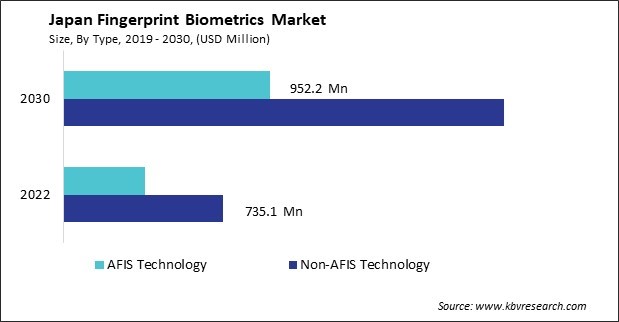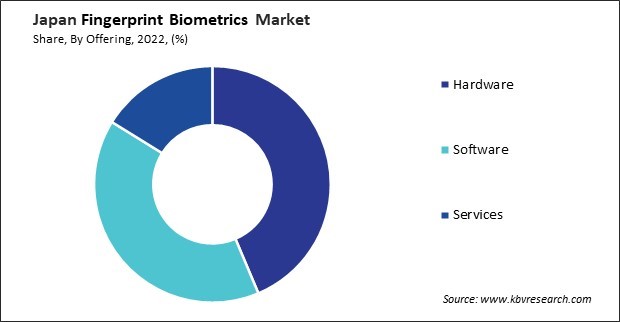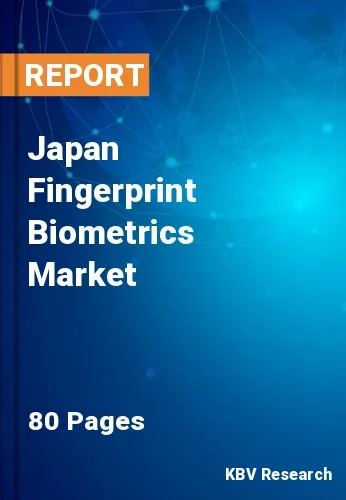The Japan Fingerprint Biometrics Market size is expected to reach $3 billion by 2030, rising at a market growth of 13.2% CAGR during the forecast period.
The fingerprint biometrics market in Japan has witnessed significant growth and innovation in recent years, driven by technological advancements, increasing security concerns, and government initiatives. One of the key drivers contributing to the growth of the fingerprint biometrics market in Japan is the rising demand for robust security solutions in both the public and private sectors. With the increasing frequency of security breaches and identity theft incidents, organizations increasingly use biometric technologies like fingerprint recognition to enhance their security measures.

Moreover, the Japanese government has been actively promoting the adoption of biometric technologies as part of its efforts to bolster national security and streamline administrative processes. Initiatives such as promoting biometric-based authentication systems in public services and developing national biometric databases have spurred investment in fingerprint biometrics technology across various sectors.
The widespread adoption of smartphones and other mobile devices has also significantly driven the demand for fingerprint biometrics in Japan. Many mobile devices now feature built-in fingerprint sensors, enabling users to conveniently unlock their devices, authorize transactions, and access secure applications using their fingerprints. This integration of fingerprint biometrics into consumer devices has expanded the reach of biometric authentication beyond traditional security applications, creating new opportunities for businesses to leverage biometric technology for user authentication and identity verification.
Moreover, the COVID-19 pandemic has further accelerated the adoption of fingerprint biometrics in Japan as organizations seek contactless authentication solutions to minimize the risk of virus transmission. Fingerprint biometric systems offer a hygienic and touchless alternative to traditional authentication methods such as PINs or keycards, making them particularly well-suited for applications in healthcare, hospitality, and retail sectors where maintaining hygiene and safety is paramount.
In Japan, the automotive industry is witnessing a significant surge in the adoption of fingerprint biometrics technology, marking a transformative shift in vehicle security and user authentication systems. One of the primary drivers behind the rising adoption of fingerprint biometrics in the automotive sector is the increasing emphasis on enhancing vehicle security. Traditional methods of key-based entry systems are vulnerable to theft and unauthorized access. The rising adoption of fingerprint biometrics in the automotive industry mirrors the growth trajectory of electric vehicles in Japan.
According to the International Trade Administration, sales of new electric vehicles in 2020 reached close to 1.4 million. New electric vehicles accounted for 36.2% of total new car sales, up from 35.2% in 2019 and 32.9% in 2017. Japanese industry demand for HEVs has been strong since the Toyota Prius was first introduced in 1997. As such, the integration of fingerprint biometrics underscores Japan's commitment to blending tradition with innovation in shaping the future of mobility.
Moreover, the convenience offered by fingerprint biometrics plays a crucial role in its adoption within the automotive industry. With fingerprint recognition technology, drivers in Japan unlock their vehicles effortlessly with a simple touch, eliminating the need to fumble for keys or memorize complex passwords. This streamlined authentication process enhances user experience and adds a layer of convenience to everyday commuting.
Furthermore, integrating fingerprint biometrics in vehicles aligns with broader trends in the automotive industry toward connectivity and smart functionality. Modern vehicles in Japan are increasingly equipped with advanced features such as keyless entry, remote start, and personalized settings. Therefore, the increasing adoption of fingerprint biometrics in Japan's automotive industry reflects a transformative shift towards enhanced security, convenience, and connectivity in vehicle technology.
In Japan, the fingerprint biometrics market is experiencing a notable surge in demand for automated fingerprint identification system (AFIS) technology. AFIS technology has become increasingly prevalent due to its accuracy, efficiency, and diverse applications across various sectors. One of the key drivers behind the growing demand for AFIS technology in Japan is the rising need for robust security measures. With increasing security breaches and identity theft, organizations and government agencies are turning to biometric solutions like AFIS to enhance their security protocols.
Moreover, the adoption of AFIS technology is also driven by the government's initiatives to bolster national security and streamline administrative processes. Government agencies in Japan are leveraging AFIS for various purposes, including criminal identification, border control, and citizen registration. Furthermore, the healthcare sector also embraces AFIS technology for patient identification and record management. Healthcare facilities are leveraging AFIS to accurately match patients with their medical records, thereby reducing errors and improving the overall quality of care.
In addition to security concerns, the increasing integration of AFIS technology in various industries is fueling industry growth. For instance, Japan's banking and financial sectors deploy AFIS for customer authentication and fraud prevention. Hence, the surge in demand for AFIS technology in Japan is driven by heightened security needs, government initiatives, and its integration across diverse sectors, including healthcare and finance.

The fingerprint biometrics market in Japan is marked by innovation, driven by a combination of established companies and emerging startups. These companies offer solutions catering to various industries and applications, from consumer electronics to government identification systems. One prominent company in the Japanese fingerprint biometrics market is Sony Corporation. Sony has pioneered biometric technology, incorporating fingerprint sensors into its consumer electronics products such as smartphones, laptops, and tablets. With a focus on reliability, accuracy, and user experience, Sony's fingerprint sensors have gained widespread acceptance among consumers, contributing to the proliferation of biometric authentication in everyday devices.
NEC Corporation, a global technology leader headquartered in Japan, is also a key player in the country's fingerprint biometrics market. The company's fingerprint recognition technology is widely used in law enforcement, border control, and civil identification systems. NEC's biometric solutions leverage advanced algorithms and large-scale matching capabilities to deliver high-performance identification and verification capabilities, meeting the stringent requirements of government and enterprise customers.
Another significant player is Fujitsu Limited, a leading Japanese multinational information technology equipment and services company. Fujitsu offers a range of fingerprint biometrics solutions for various applications, including access control, time and attendance tracking, and identity verification. The company's advanced biometric technology, combined with its hardware and software development expertise, makes it a preferred choice for organizations seeking reliable and secure authentication systems.
Another notable contender in the Japanese fingerprint biometrics sector is Hitachi, Ltd. Hitachi offers a range of biometric solutions, including fingerprint recognition systems for access control, employee authentication, and secure payment applications. The company's fingerprint sensors and algorithms are known for their accuracy, speed, and reliability, making them suitable for various commercial and industrial applications. With a strong emphasis on technological innovation, reliability, and security, these companies continue to push the boundaries of what is possible with fingerprint biometrics, shaping the future of authentication and identity verification in Japan.
By Type
By Offering
By End User
Our team of dedicated experts can provide you with attractive expansion opportunities for your business.

